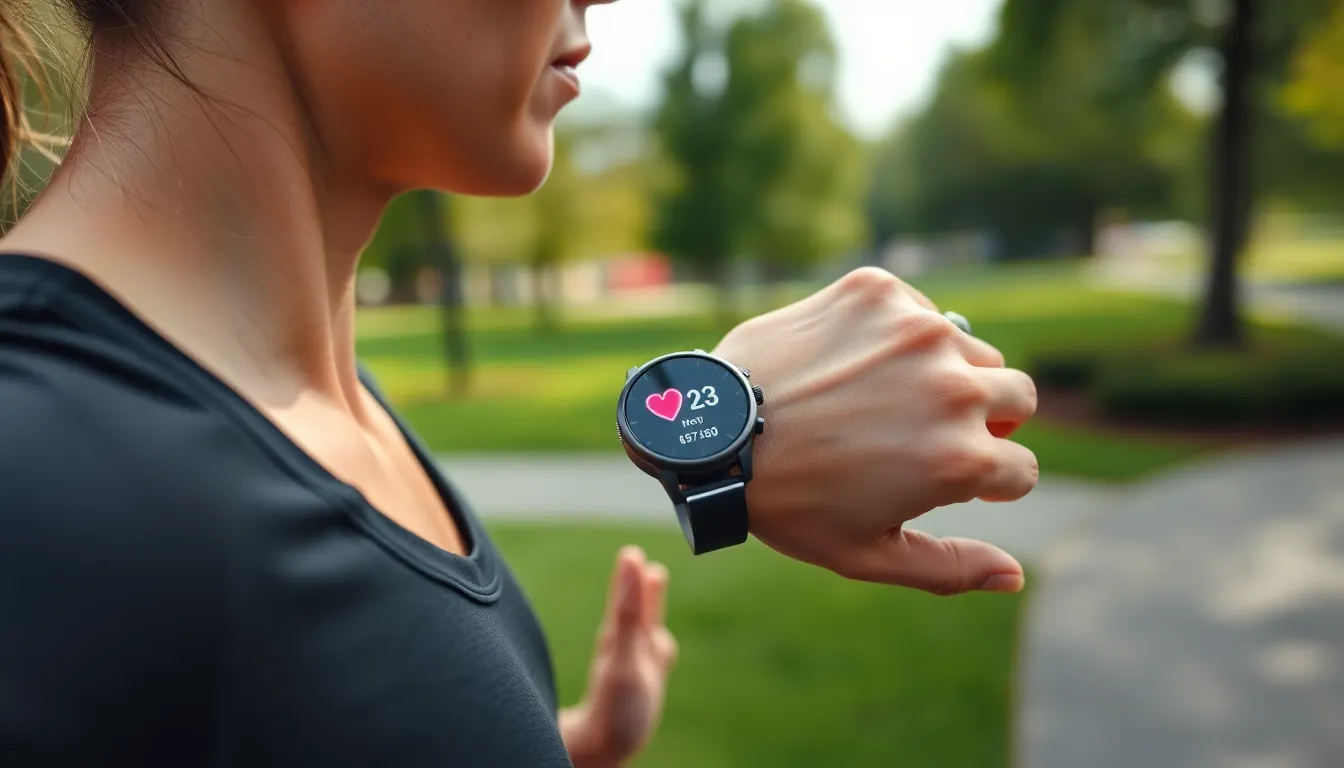Table of Contents
ToggleIn a world where the only thing beating faster than your heart is your morning coffee, smart watch heart monitors have become the go-to gadget for health enthusiasts and couch potatoes alike. These nifty devices don’t just tell time; they keep tabs on your ticker, ensuring you’re not just living life but thriving in it. Imagine receiving a gentle nudge when your heart rate spikes from that intense Netflix binge or when you’re about to break a sweat at the gym.
With technology that fits snugly on your wrist, these monitors offer real-time insights into your heart health, making it easier to stay on top of your fitness goals. Whether you’re a seasoned athlete or someone who thinks “exercise” is a four-letter word, a smart watch heart monitor can add a sprinkle of motivation to your daily routine. Who knew keeping your heart in check could also be this stylish and fun?
Overview Of Smart Watch Heart Monitors
Smart watch heart monitors serve multiple purposes beyond just keeping time. They track real-time heart rate, offering insights into cardiovascular health. Users benefit from features like continuous heart rate monitoring and alerts for irregularities.
These devices often utilize photoplethysmography technology, which detects blood volume changes through light absorption. Many models provide comprehensive data on resting heart rate, heart rate variability, and exercise recovery. Real-time feedback encourages users to adjust their workouts and lifestyle choices.
Some smart watches connect to health apps, aggregating data for analysis. This integration enables users to visualize trends over days, weeks, or months. Health reports can aid in understanding long-term heart health and motivate lifestyle changes.
Many brands offer additional features like ECG (electrocardiogram) capabilities, enhancing heart monitoring accuracy. Wearers can quickly check pulse rates, which is vital for those managing specific health conditions. Certain models even notify users when their heart rate exceeds or drops below set thresholds.
Affordability varies widely among different smart watch heart monitors. Buyers can find budget-friendly options that deliver basic functionality. Conversely, premium models provide advanced features, appealing to dedicated fitness enthusiasts.
Wearable technology continues evolving, with manufacturers enhancing sensor technology and data accuracy. As these devices gain popularity, they play an increasingly important role in personal health management.
Key Features

Smart watch heart monitors boast a variety of features that enhance heart health management for users. These devices prioritize real-time data, making them invaluable for fitness tracking and health monitoring.
Heart Rate Tracking Technology
Heart rate tracking technology employs photoplethysmography, which detects blood flow changes. Devices use this technology to measure heart rates continuously throughout the day. Advanced models display metrics like resting heart rate, heart rate variability, and recovery times post-exercise. Options exist to receive alerts for unusual heart rates, ensuring users stay informed. Many smart watches connect seamlessly with health apps, allowing users to interpret heart data through visual trends.
Accuracy and Reliability
Accuracy remains a crucial factor in heart rate monitoring. Quality smart watches often show consistent readings, giving users confidence in their health data. Sensors in these devices consistently perform well during varied activities, such as running or cycling. Some models even feature ECG capabilities, enhancing the precision of heart monitoring. Regular software updates improve performance and reliability over time. Users should invest in models known for their accuracy to achieve the best heart health insights.
Benefits Of Using A Smart Watch Heart Monitor
Smart watch heart monitors provide numerous advantages for users focused on maintaining cardiovascular health. These devices enhance daily life through innovative health insights.
Health Monitoring
Real-time heart rate tracking delivers immediate insights. Continuous monitoring helps users notice changes in their heart health instantly. Alerts for irregularities prompt timely action, potentially preventing serious health issues. Many smart watches incorporate advanced features like ECG capabilities, offering enhanced monitoring accuracy for detecting abnormal heart rhythms. Users can analyze resting heart rate, heart rate variability, and exercise recovery. Such data informs decisions regarding workouts and lifestyle adjustments. Integration with health apps allows seamless tracking of long-term trends in cardiovascular health, providing a comprehensive view of heart health over time.
Fitness Tracking
Fitness enthusiasts benefit significantly from smart watch heart monitors. These devices track exercise intensity through heart rate data, making it easier to optimize workouts. Accurate metrics motivate users to meet fitness goals and enhance overall performance. By monitoring recovery times post-exercise, individuals can ensure they’re not overtraining. Variety in workout features, such as specific heart rate zones for different activities, aids users in tailoring their fitness routines. Many smart watches also offer activity tracking for steps and calories burned, supporting a well-rounded approach to health management. This combination of features makes fitness tracking more effective and enjoyable for users.
Popular Smart Watch Heart Monitors
Smart watch heart monitors vary by brand, offering unique features and specifications. Popular models include Garmin, Apple, Samsung, and Fitbit.
Comparison of Top Brands
Garmin focuses on fitness, providing advanced metrics for athletes and health enthusiasts. Apple integrates seamlessly with its ecosystem, featuring robust health monitoring capabilities. Samsung delivers a balance between style and technology, appealing to users seeking both fashion and functionality. Fitbit emphasizes heart health tracking, ensuring accessibility to users of all fitness levels. Each brand maintains distinct advantages, catering to specific user preferences in terms of usability, design, and functionality.
User Reviews and Ratings
Users frequently highlight the accuracy and reliability of smart watch heart monitors. Positive feedback often stems from features like real-time tracking and notifications for irregular heart rates. Many customers appreciate the seamless integration with health apps, allowing easy data analysis. Some variants receive praise for battery life and design aesthetics, enhancing daily wearability. Ratings generally reflect satisfaction with performance, primarily when devices meet user health needs and expectations.
Limitations and Considerations
Smart watch heart monitors come with specific limitations that users should be aware of. Accuracy may vary depending on device models and individual physiological factors. Different wrist sizes and skin tones can influence sensor effectiveness, leading to occasional discrepancies in heart rate readings.
Companies design these devices for general fitness monitoring, not as medical-grade equipment. Users with pre-existing health conditions should consult healthcare professionals before relying solely on smart watches for heart health insights. These devices lack FDA approval in many regions, further emphasizing the need for caution.
Battery life also poses a consideration for users. Frequent use of heart monitoring features can lead to quicker battery drains, requiring more frequent charging sessions. Some smart watches offer extended battery life, yet running multiple features simultaneously may still impact performance.
Data privacy remains a significant concern. Most brands collect personal health data, highlighting the importance of understanding data usage and sharing policies. Users should read privacy agreements carefully to make informed choices about their health information.
Integration with third-party apps varies by device. While many smart watches synchronize smoothly with popular health apps, others may face compatibility issues. Users should verify app compatibility to ensure seamless data tracking.
Lastly, user experience can differ across brands. Some individuals may prefer the interface of certain models over others, impacting overall satisfaction. Exploring different options helps users find devices that meet their specific needs and preferences.
Smart watch heart monitors are transforming how individuals approach health and fitness. By providing real-time heart rate data and insights into cardiovascular health, these devices empower users to make informed lifestyle choices. Their stylish designs and advanced features make them not just functional but also appealing for everyday wear.
As technology continues to advance, the accuracy and reliability of these monitors will likely improve, enhancing their role in personal health management. While they’re not a substitute for professional medical advice, they offer valuable tools for tracking heart health and optimizing fitness routines. Users should consider their specific needs and preferences when choosing a model, ensuring they find the right blend of functionality and style.











